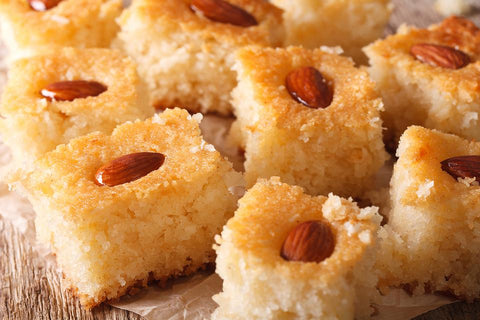Both Passover and Easter are right around the corner, and both overlap this year once again. This frequent coincidence or overlapping of the Christian Holy Week with the eight-day celebration of Passover highlights the fact that they are both festivals of equal merit. Side by side they each remind us of the promise of redemption which is at the core of the historical events being commemorated in each. Aptly so, this message is again echoed in the new season of Spring bursting forth all around us, as we witness nature start afresh and take on life again.
I hope you enjoy these two recipes included here, which have been preserved through centuries by the Sephardic Jewish community, to help celebrate this season that we share in common.
The saying "tell me what you eat, and I'll tell you who you are." points to the very deep truth that food is not only fuel for our bodies, but acts as a repository of a people's culture and identity and tells of their story through the ages, thus helping to preserve their history from generation to generation. Jewish people know this only too well, but so do those peoples who have been around long enough.
Pistachio and rosewater cake

The Persian Love Cake, which this cake is a version of, has been around since at least the 16th century. It is typically flavoured with rose water, lemon, saffron, cardamom, orange blossom water and pistachios. Once baked, you can add rose water or saffron glaze – topped with edible rose petals (buds in our case) and crushed pistachios.
Rottem Lieberson, cookbook author, blogger, and a proud Persian, says the Persian Love Cake, , was made by her family members for Rosh Hashanah and Nowruz, the Persian New Year which falls on the spring equinox. In some versions, the cake is made entirely with semolina or almond flour. The latter version makes this cake a great addition to a Passover menu (source: Reformed Judaism blog).
For the cake:
- 3 cardamom pods, bruised, seeds reserved, pods discarded
- 1 cup, 5⅓ oz, 150g, pistachios, plus extra chopped pistachios to serve
- 1 cup, 3½ oz, 100g, almond meal
- 1⅛ cup, 6 oz, 170g Organic Einkorn Pancake and Baking Mix
- 1¼ cup, 10 oz, 280g unsalted butter
- very scant 1½ cup, 10 oz, 280g sugar
- 4 eggs, lightly beaten
- finely grated zest of 1 lemon, plus 1 tbs lemon juice
- 2 tbs rosewater
- ½ tsp vanilla extract
For the glaze:
- 2 cups, 8½ oz, 240g, powdered sugar
- 1 tablespoon rose water
- 3-4 tablespoons milk
Topping:
- ¼ cup chopped pistachio, slightly toasted in an oil-free pan, finely chopped
- rose buds or rose petals
Directions:
- Preheat oven on to 180°C.
- To make the cake, place cardamom seeds and pistachios in a food processor and whiz until pistachios are finely ground. Transfer pistachio mixture to a bowl and add almond meal, semolina, baking powder and 1/4 tsp fine salt. Stir to combine.
- Place butter and sugar in a stand mixer fitted with the paddle attachment and beat until well combined (be careful not to overwork – you don’t want a lot of air in the mixture). With the motor running, slowly add egg, beating well. Fold through the pistachio mixture, then fold through lemon zest and juice, rosewater and vanilla until just combined. Spread batter into prepared pan and use a palette knife to smooth the surface. Bake for 1 hour or until a skewer inserted in the centre of the cake comes out clean but a little oily.
- Make the glaze: Into a medium bowl, sift the confectioners sugar. Add the rose water and milk and stir to combine. Glaze should be thick, but not like a paste. It should be pourable. If it's too thick, add more milk half a tablespoon at a time until desired consistency is reached. Pour glaze over cooled cake. Decorate with chopped pistachios and rose buds.
recipe adapted from <https://www.delicious.com.au/>
Tishpishti

Semolina cakes (cakes made of a coarse flour from durum wheat) are very common throughout the Balkans. Some people add dates to them, some add nuts, and some - as in this recipe - grind the nuts and add it to the cake batter. All versions have one thing in common: an easy-to-make semolina batter that doesn't require kneading, rising, or rolling. The name originates from the Turkish words Tez Pişti - cooked quickly - also spelled Tishpishti, Pishpishtil, Pishpishtin, etc. Tishpishti is a traditional dish among Sephardic Jews, especially on Passover, as it is generally unleavened. It is also served on Rosh Hashanah.
It is described by authors Lori Stein and Ronald H. Isaacs in Let’s Eat: Jewish Food and Faith as a Turkish version of the traditional lekach (honey cake) served for the Jewish High Holidays
Ingredients for the cake:
- 1 cup, 4¼-5 oz, 120-150g, Organic Einkorn Pancake and Baking Mix
- 1 full cup, 4¼ oz, 120g, semolina (we use Kamut flour, an ancient grain)
- 1 cup, 3½ oz, 100g, nuts or almonds, finely ground
- 1 cup, 7 oz, 200g, sugar
- 3 eggs
- Zest and juice of 1 orange
- 1 teaspoon vanilla extract
- 1⅓ stick, 5⅓ oz, 150g, butter or 1 cup oil
- ⅓ cup whole bleached almonds
For the Sugar syrup:
- 1½ cups, 10½ oz, 300g, sugar (use 1 cup if you prefer a less sweet cake)
- 1½ cups, 12 fl oz, 339g, water
- Juice of half a lemon
Instructions:
- Prepare the sugar syrup by bringing the syrup ingredients to a boil. Simmer for 15 minutes. Remove from heat, let cool and keep aside.
- Mix the dry ingredients in a bowl.
- In a separate bowl, beat the eggs, orange juice, vanilla extract, orange zest and butter or oil in a large bowl.
- Mix the dry ingredients with the liquid mixture until smooth.
- Transfer to a buttered or oiled 9" glass dish.
- Flatten using a knife or offset spatula and cut into diamonds by slicing the batter crosswise, then making diagonal cuts across the rows. Place an almond in the middle of each diamond.
- Bake in an oven preheated to 350°F for 25 minutes or until golden brown, when a toothpick inserted into the center comes out clean.
- Pour the room temperature syrup over the freshly baked cake and let it absorb for at least one hour before serving.
- Serve warm, preferably with whipped cream.
recipe adapted from <https://reformjudaism.org
